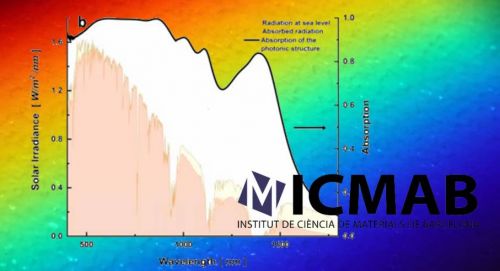
15/02/2018
ICMAB traps sunlight with superabsorbent nanomaterials
ICMAB traps sunlight with superabsorbent nanomaterials
In renewable energies, increasing efficiency is a key challenge in the production of “photovoltaic” electrons. This includes elaborating materials that can absorb the largest possible sunlight spectrum.
Great news from the Institute of Materials Science of Barcelona (ICMAB), a Barcelona Synchrotron Park’s partner: researchers led by Dr. Agustín Mihi, have created materials that largely absorb a wide range of the solar spectrum, between 400 and 1500 nm (visible light and infrared radiations), using an ultrathin layer of less than 100 nm thick of material.
The followed strategy, low cost and fully scalable, is based on combining the thin layer deposition of semiconductors on metals, and the nanostructuring of the material forming photonic crystals. The obtained superabsorbers materials have many potential applications, especially in the field of photovoltaic energy and photodetection.
Moreover, the researchers provide, in the study published in Advanced Materials, the design guidelines to synthesize other types of materials following the same strategy.
Great news from the Institute of Materials Science of Barcelona (ICMAB), a Barcelona Synchrotron Park’s partner: researchers led by Dr. Agustín Mihi, have created materials that largely absorb a wide range of the solar spectrum, between 400 and 1500 nm (visible light and infrared radiations), using an ultrathin layer of less than 100 nm thick of material.
The followed strategy, low cost and fully scalable, is based on combining the thin layer deposition of semiconductors on metals, and the nanostructuring of the material forming photonic crystals. The obtained superabsorbers materials have many potential applications, especially in the field of photovoltaic energy and photodetection.
Moreover, the researchers provide, in the study published in Advanced Materials, the design guidelines to synthesize other types of materials following the same strategy.
More news
20/09/2018
UAB’s researchers awarded by ERC
14/09/2018
More than 8,600 foreign companies in Catalonia
06/09/2018
SMEs: a European call for access to synchrotrons
27/07/2018
ICMAB and ICN2 work on the batteries of the future
20/07/2018
Molecular mimicry does not mislead ALBA!
13/07/2018
How about olive pits to filter the air?!









